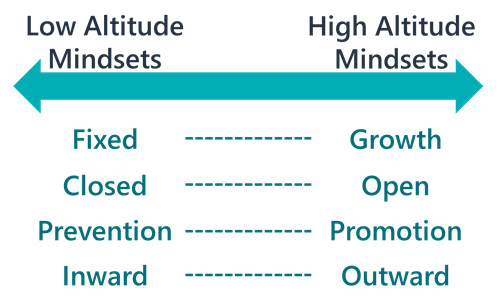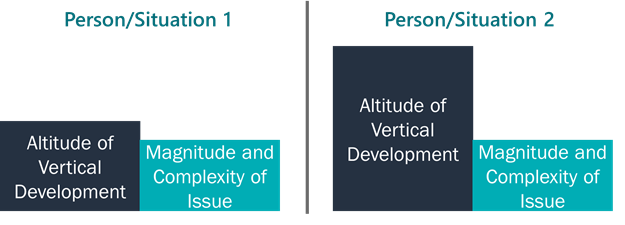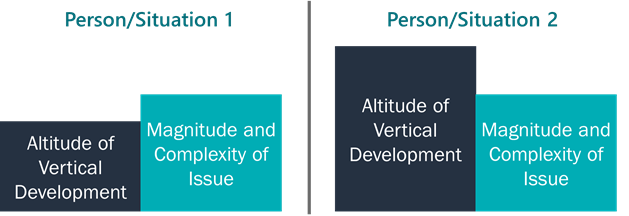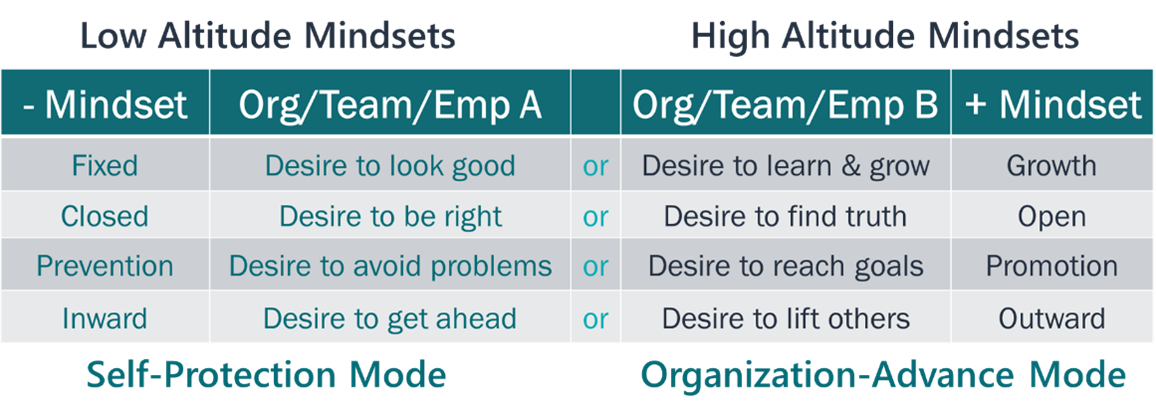Vertical Development: Elevating Your Leadership
To receive the weekly blogs via email, please sign-up here.
This blog is provided by Ryan Gottfredson, Assistant Professor of Leadership at California State University-Fullerton, author of Success Mindsets and a Mindset Consultant/Trainer/Speaker. It is a companion to his interview on Innovating Leadership, Co-creating Our Future titled Success Mindsets: Your Keys to Unlocking Greater Success in Your Life that aired on Tuesday, December 15th, 2020.
There are two types of development leaders can go through: horizontal development and vertical development.
Horizontal development involves helping leaders add more knowledge, skills, and competencies. The focus of horizontal development is on helping leaders to DO more.
It is not unlike adding a new app to an iPad, making it more capable of performing more functions
Vertical development involves helping leaders elevate their thinking capacity to better navigate more complex and uncertain environments. The focus of vertical development is on helping leaders to BE more able.
Instead of adding a new app to an iPad, vertical development is upgrading the iPad to a newer, more capable model
Question: Of these two forms of development, which is most commonly focused on for leadership development?
The vast majority of leadership development focuses exclusively on horizontal development. Very little leadership development focuses on vertical development.
Why is Vertical Development So Important for Leaders?
When two different leaders with different altitudes of vertical development encounter a situation that is low in complexity, both of these leaders are likely to navigate this effectively.
But, if those same leaders encounter a situation that is high in complexity, it is likely that only the one with greater vertical development will be able to handle this effectively.
This is critical to understand because leaders are facing increasingly facing more and more complex and uncertain circumstances, something that the COVID-19 pandemic hasn’t helped with.
This hopefully demonstrates that vertical development can be a competitive advantage for individual leaders as well as for entire organizations.
Quick Vertical Development Self-Assessment
Here are questions that I have come across that might be decent revealers of leaders’ altitude of vertical development:
- How do you respond to constructive criticism?
- Would you be willing to let someone survey your employees about your effectiveness as a leader?
- Is it bad to build close relationships with those you lead?
- Can you hold competing perspectives on a controversial topic (e.g., abortion)?
- Do you generally focus on the outcomes you want or on the drivers of the outcomes you want?
- When something goes wrong, do you ask yourself: “Who am I being that their eyes are not shining?”
How do we help leaders vertically develop?
To improve leaders’ vertical development, we must get to the core of one’s verticality: Their mindsets.
Both psychology and neuroscience has independently identified mindsets as the foundational mechanism that governs leaders’ processing and operations. This is because our mindsets are our mental lenses that shape how we see and interpret our world, and how we see and interpret our world shapes the quality of our thinking, learning, and behavior.
Fortunately, there have been 30+ years on mindsets, which has led to the identification of four sets of mindsets, ranging on a continuum from less vertically developed and more vertically developed.

These mindsets come to life when we recognize the common desires that flow from these mindsets:
If you would like to assess the quality of your mindsets, I have developed a FREE personal mindset assessment, which can be taken here: https://ryangottfredson.com/personal-mindset-assessment
To Summarize…
Most leadership development focuses on horizontal development, but because of the increasing complexity and uncertainty in our world, we need leaders that are vertically developed.
In order to develop vertically, we must get at core of our verticality: our mindsets.
If we can become conscious and aware of our mindsets, it provides us with the opportunity to shift to a more elevated way of processing and behaving.
Climb on!
To become a more innovative leader, you can begin by taking our free leadership assessments and then enrolling in our online leadership development program.
Check out the companion interview and past episodes of Innovating Leadership, Co-creating Our Future, via iTunes, Google Play, TuneIn, Stitcher, Spotify and iHeartRADIO. Stay up-to-date on new shows airing by following the Innovative Leadership Institute LinkedIn.
About the Author
Ryan Gottfredson, Ph.D. is a cutting-edge mindset author, researcher, and consultant. He helps improve organizations, leaders, teams, and employees by improving their mindsets.
Ryan is the Wall Street Journal and USA Today best-selling author of “Success Mindsets: The Key to Unlocking Greater Success in Your Life, Work, & Leadership” (Morgan James Publishers). He is also a leadership professor at the College of Business and Economics at California State University-Fullerton. He holds a Ph.D. in Organizational Behavior and Human Resources from Indiana University, and a B.A. from Brigham Young University.
As a consultant, he works with organizations to develop their leaders and improve their culture (collective mindsets). He has worked with top leadership teams at CVS Health (top 130 leaders), Deutsche Telekom (500+ of their top 2,000 leaders), and dozens of other organizations. As a respected authority and researcher on topics related to leadership, management, and organizational behavior, Ryan has published over 19 articles across a variety of journals including: Leadership Quarterly, Journal of Management, Journal of Organizational Behavior, Business Horizons, Journal of Leadership and Organizational Studies, and Journal of Leadership Studies. His research has been cited over 2,500 times since 2015. Connect with Ryan here.
Image by Gerd Altmann from Pixabay








